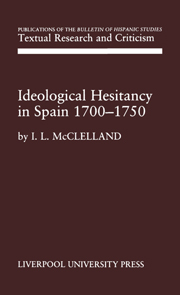Book contents
- Frontmatter
- Contents
- Dedication
- Preface
- CHAPTER 1 Reason of Unreason in the Spanish Vulgo
- CHAPTER 2 The False Alarm of ‘Scepticism’
- CHAPTER 3 The Vulgo-Conception of Scientific Evidence
- CHAPTER 4 The Psychological Significance of Pulpit Oratory
- CHAPTER 5 Witness of the Popular Stage
- CHAPTER 6 The Disturbing Effects of the Periodical Press
- Index
Preface
- Frontmatter
- Contents
- Dedication
- Preface
- CHAPTER 1 Reason of Unreason in the Spanish Vulgo
- CHAPTER 2 The False Alarm of ‘Scepticism’
- CHAPTER 3 The Vulgo-Conception of Scientific Evidence
- CHAPTER 4 The Psychological Significance of Pulpit Oratory
- CHAPTER 5 Witness of the Popular Stage
- CHAPTER 6 The Disturbing Effects of the Periodical Press
- Index
Summary
My intention in this study has not been to give a systematized account of crises in Spain's eighteenth-century thought, or to discuss eighteenth-century arguments for and against recognizable ilustrismo, or intellectual enlightenment. Much excellent research has already been published on the subject. Rather have I been interested to observe the naturalness of that period's atmosphere of ideological confusion. For which reason typical examples have been chosen of hesitancy and perplexity in writers of relatively reasonable and liberal views: those whose reasonable understanding of new directions of thought is partially limited by reasonably human caution. There are at least two kinds of reasonableness in this respect: that of the far-sighted genius, and that of the intelligent man who thinks from the standpoint of his present, or local, intellectual experience. The latter's influence is usually indirect, certainly less conspicuous than that of the blind traditionalist whose opposition to ilustrismo is, out of fear, dramatically emotional. Yet it is the rational, half-way attitude of intelligent uncertainty, especially in well-known academicians, which most radically encouraged confusion in ill-informed masses of the general public, which ironically impeded a right understanding of the period's Feijoos, Martínezs, Islas, and their compeers, and which incidentally complicated polemic.
- Type
- Chapter
- Information
- Ideological Hesitancy in Spain 1700-1750 , pp. vii - viiiPublisher: Liverpool University PressPrint publication year: 1991

